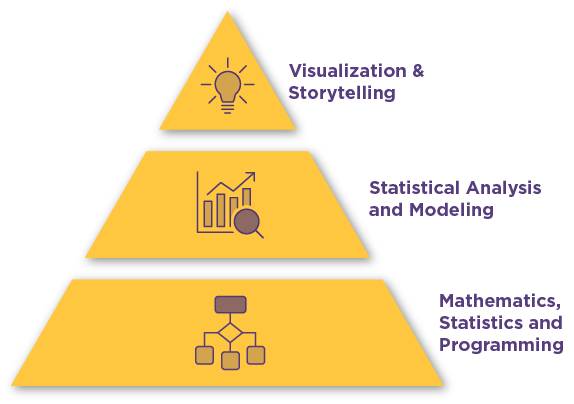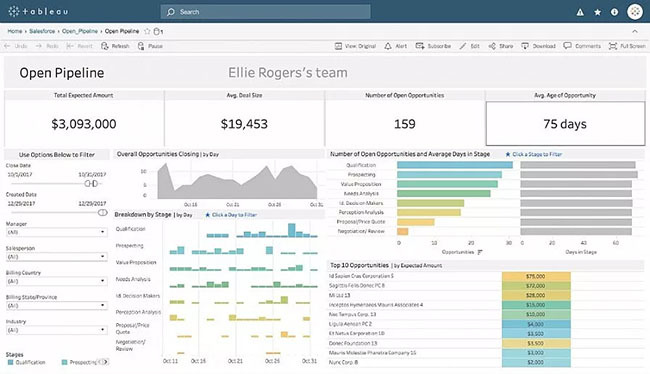
Data science has emerged as a leading field in our digital information age, offering valuable insights from vast, complex data sets to inform decision-making and solve real-world problems.
Whether you're a recent high school graduate, a professional seeking a career change, or a working adult looking to enhance your career through online education, it's key to understand the essential skills and steps to excel as a data scientist.
Data science is a multidisciplinary field that extracts insights and knowledge from large and complex data sets. It combines elements of statistics, mathematics, and computer science, in addition to expertise in one's industry.
The power of data science lies in its ability to extract meaningful information from data and use it to drive informed decision-making. By analyzing large volumes of data, data scientists can identify trends, discover hidden patterns, make predictions, and gain valuable insights that help organizations make data-driven decisions.
Data science finds applications in various industries and sectors. For example, in healthcare, data science is used to analyze patient data and develop personalized treatment plans. In finance, it helps with fraud detection, risk assessment, and financial forecasting. Data science is also used in marketing to analyze consumer behavior and optimize advertising campaigns. See also "What Can I Do With a Master's in Data Science?"

Data Science is a field that impacts every organization, which means the potential and opportunity for careers in data are endless. We are in an information age, where data is king and organizations that aren't leveraging and utilizing data will be left behind by their competition—making data analysis skills useful to everyone.
The foundation of data science lies in mathematics, statistics, and programming.
Data visualization, machine learning, and complex problem-solving skills are also highly valued. You can acquire these skills at Bellevue University through flexible, online data science courses while maintaining your current job or family commitments.
While courses will help you learn the necessary skills, some of the most valuable assets you can gain while in school are building a portfolio of projects, networking with professionals in the field, and getting up-to-date with the latest trends and technologies.
As data science continues to evolve, it's essential to stay informed about future trends in the field. Artificial intelligence (AI), machine learning, big data analytics, and ethical considerations in data science are key areas to watch.

Experience and a bachelor's or master's degree in data science open a wide range of opportunities. Data scientists are in high demand across industries, including technology, healthcare, finance, government, e-commerce and marketing. With the right skills and experience, you can explore roles such as data analyst, data scientist, data engineer, machine learning engineer, or even chief data officer.
Data science is a fast-growing field, and if you're considering a career in data science, there are numerous key skills to keep in mind. Let's look at a list of skills, tools of the trade, and techniques that employers expect data scientists to know and work with.
One of the basic skills required for data science is proficiency in programming languages. Python and R are two popular languages widely used in the field. A strong foundation in one or more of these languages is crucial for data scientists.
Machine learning and deep learning play a central role in data science by enabling systems to learn from data and make predictions or decisions without being explicitly programmed. These approaches use algorithmic models and techniques such as:
Together, they help extract insights from complex datasets and drive automation in decision-making across industries.
Cloud computing and big data technologies support scalable data storage and processing. Familiarity with the following will be helpful:
Alongside programming, statistical analysis and modeling are vital skills for data scientists. Understanding statistical modeling and techniques enables data scientists to identify patterns, build predictive models, and draw meaningful conclusions from data. Data science includes knowledge of:
Data wrangling and database management are essential for data scientists to ensure the accuracy, consistency, and accessibility of data before analysis. These skills involve:
Data visualization techniques are equally important in data science. Communicating insights through visual representations effectively is essential for conveying complex information. Effective data visualization can help in presenting complex data clearly for understanding. Data scientists use data visualization tools such as these to create interactive and visually appealing charts, graphs, and dashboards:

Model deployment in data science is essential because it transforms theoretical models into practical, real-world solutions that directly impact business processes and decision-making. It bridges the gap between development and practical use by:
Web scraping enables data scientists to gather large amounts of information from websites quickly and efficiently, especially when datasets are not readily available through APIs. Techniques include:
See a complete list of data science courses available at Bellevue University.
Success in data science isn't just about coding and statistical analysis—it's also about understanding the business context, communicating effectively, and collaborating with others. Non-technical business skills are essential for turning data into real-world impact, helping data scientists align their technical work with organizational goals, collaborate across teams, and drive informed decisions.
Here are the key business skills data scientists need to be successful:
Data scientists must understand the industry and align their work with business objectives. Understanding the industry ensures their insights drive strategic decisions and identify opportunities for growth.
Translating complex analyses into clear, actionable insights is essential for influencing leadership decisions. Strong communication helps bridge technical and strategic perspectives.
Efficiently managing analytics projects ensures timely, goal-aligned results. This skill helps keep deliverables on track and teams aligned. This skill involves:
Collaboration drives innovation and shared success. Working with cross-functional teams enhances the relevance and impact of data science projects. Including subject-matter experts is essential for problem-solving and project success. Key factors include:
Analyzing challenges and creating effective solutions are core parts of a data scientist's role. A sharp, inquisitive mindset helps uncover insights others might miss. These skills allow data scientists to analyze challenges, troubleshoot issues, and develop innovative solutions. Key attributes include:
A genuine interest in continuous learning and innovation helps data scientists stay on top of new trends and methodologies. Passionate professionals stay ahead of trends and inspire new ideas in a fast-evolving field. Important factors include:
Responsible data use builds trust with stakeholders and ensures compliance with ethical standards, including privacy and transparency. Data scientists must balance innovation with accountability. Critical elements include:
Today's organizations are absolutely inundated with data. But data doesn't have value unless businesses have skilled employees who are able to provide the kind of insights that turn that data into better decisions and business strategies. Graduates know how to analyze data, manage it at the enterprise level, and transform it into real-life actionable solutions.
If you're considering a career as a data scientist, there are several critical steps you can take to go down this exciting path.
A strong educational foundation is vital for a successful career in data science. Consider pursuing a degree in computer science, mathematics, or data science degree, where offered. Additionally, obtaining certifications like the Certified Analytics Professional (CAP) can enhance your credibility and demonstrate your expertise in the field. Other paid learning platforms offer specialized courses to refresh skills you may already have acquired.
While theoretical knowledge is essential, gaining practical experience is equally crucial. Engage in real-world projects that allow you to apply your skills to solve complex problems. In Bellevue University's online data science bachelor's or master's degree, you'll build a data science portfolio based on real-world projects you complete throughout the program. Building a portfolio of projects will showcase your abilities and demonstrate your passion and dedication to potential employers.
The portfolio aspect of Bellevue University's data science program takes it to the next level. It makes sure students have exposure to the same tools and technology that businesses are using today.
Networking plays a significant role in the data science community. Attend industry events, conferences, and meetups to connect with professionals in the field. Join online communities and engage in discussions to stay up-to-date with the latest trends and advancements in data science. A strong professional network can open doors to valuable opportunities and collaborations.
Following this path can pave the way for a successful career as a data scientist. Continuous learning and staying current with emerging technologies are key to thriving in this rapidly evolving field.
On your data scientist career journey, it's crucial to gain access to various resources that can help you acquire the essential skills and take the necessary steps toward your goal. Here are some valuable resources that can aid you in your journey:
Engaging with data science communities and forums can provide valuable insights and networking opportunities. These platforms allow you to connect with other data science enthusiasts, seek guidance from experienced professionals, and participate in discussions on the latest trends and techniques. Additionally, engaging in real-world data projects and participating in "Kaggle" competitions can help you apply and refine your skills.
Some popular communities and forums include Kaggle, Data Science Central, and Reddit's r/datascience. Sources for additional information, professional development and networking include:
You can enhance your skills, stay updated with industry advancements, and connect with individuals who share your passion for data science. Staying abreast of emerging technologies is crucial for anyone in data science. By embracing continuous learning, data scientists can unlock new possibilities and contribute to the ever-evolving field.
I believe the combination of these skills with my background in engineering are the competencies needed to make an impact in the field.
At Bellevue University, you can pursue a data science bachelor's or master's degree. Additionally, we offer a graduate certificate of completion in Foundations of Data Science, consisting of courses from our master's program. Contact us to learn more and advance toward your online data science degree.
Discover how Bellevue University's Data Science Degree can prepare you for success.
Get Started Today